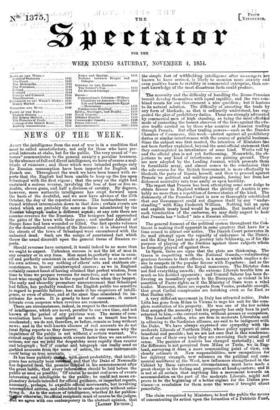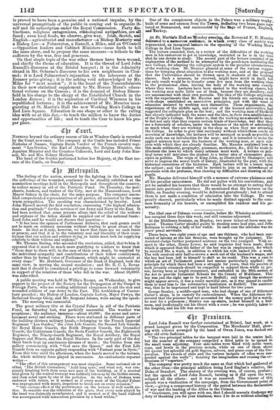The claim recognized by Ministers, to lend the public the
means of concentrating its action upon the formation of a Patriotic Fund, is proved to have been a genuine and a national impulse, by the universal promptitude of the public in coming out to organize it- self and its subscription under the Royal Commission. Party dis- tinctions, religious antagonisms, ethnological antipathies, are fused ; even local feuds, we observe, give way. Irish, Scotch, mad English—agriculturist and manufacturer —a Bishop Moriarty mood a Bishop Lee—a Palmerston, a Russell, a Miles, and an O'Connell —Opposition leaders and Cabinet Ministers—issue forth to tell the same story, and to propose the same measure—a tribute to the sufferers by the war, free and generous.
On that staple topic of the war other themes have been wound, and chiefly the theme of education. It is the thread of Lord John Russell's discourse at the Bristol banquet; it is the Admiralty strand in Mr. Osborne's discourse to his own neighbours in Clon- mel ; it is Lord Palmerston's injunction to the labourers at the Romney prize-giving ; it is the aching void acknowledged by Mr. Miles for " next session " ; it is the boast of the Nonconformists in their new statistical supplement to Mr. Horace Mann's educa- tional volume on the Census ; it is the demand of Bishop Bloom- field in his charge to the clergy of the Established Church in the London diocese; it is the aspiration of Cardinal Wiseman in his republished lectures ; it is the achievement of Mr. Maurice inau- ating at St. Martin's Hall the new Working Men's College in Red Lion Square. Education in one shape or other is the ruling idea with us at this day,—to teach the million to know the duties and opportunities of life ; and to teach the Czar to know his pro- per place.

























 Previous page
Previous page